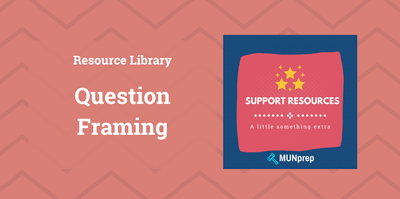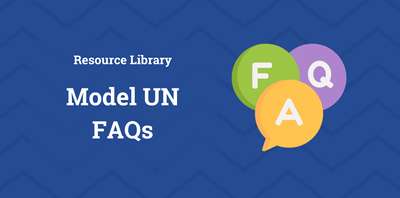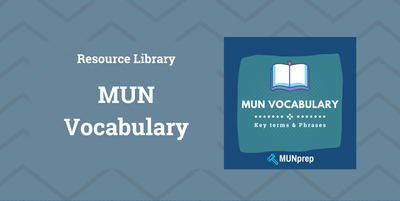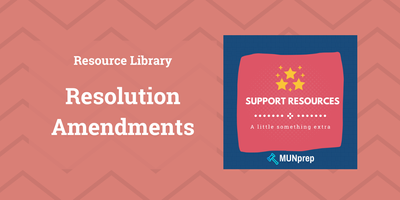Model UN Ultimate Guide – Everything you need to know
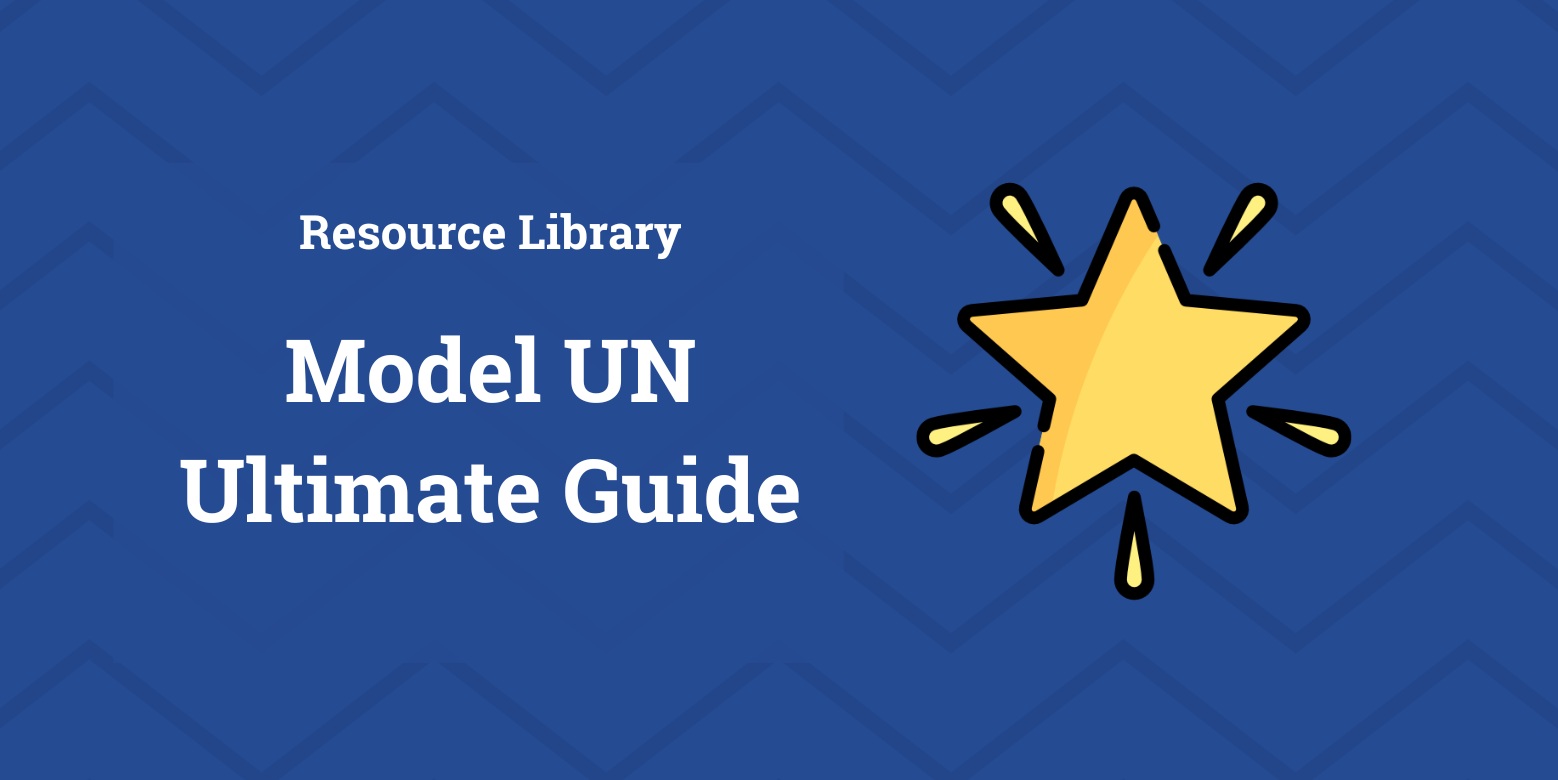
Welcome to the Model UN Ultimate Guide! Whether you’re a novice delegate or a MUN expert, we’ll teach you the essentials of committee preparation, time management, and negotiation that will get you ready for your next conference.
This is the Model UN guide that you’ve been looking for. By the end of this walk through, you’ll be motioning and caucusing like a pro.
With this guide, you’ll have everything you need to get started. Just remember - Model UN is best practised through participation, so make sure you find a conference near you!
How to use this guide
This article contains a broad overview of all things MUN. But, if you’re a more experienced delegate it might be useful to skip straight to part 2 – this is where we start with our conference prep road map.
If you’re totally new to Model UN, there’s going to be a lot of new information here. But don't worry! Feel free to bookmark this guide and come back to it later.
What You will Learn
Here’s the basic breakdown of what you can expect from this guide. If you’ve already gone through a few sections, feel free to skip ahead and get right back to where you were!
The Basics
An introduction to the world of Model UN and a review of the first things that every delegate should know.
Conference Preparation
A summary of the most important aspects of Model UN Conference preparation.
The Conference Weekend
We show you what to expect from a Model UN Conference and some important essentials.
Your Next Steps
We give you some tools to assess your conference performance.
Part 1 – Basics of Model UN
Model UN is an activity where you hone skills in negotiation, public speaking, and writing while dealing with meaningful real-world problems. You step into the shoes of world leaders and professional diplomats and solve problems in ways that you see fit.
Why learn Model UN
It’s now more important than ever to have a basic understanding of the international system, learning Model UN can introduce you to this world. It can also equip you with the tools to approach any complex issue that you read about in the news.
Participating in a Model UN conference can help delegates to work on their public speaking skills. Stepping in front of a committee to make that first speech might be daunting, but every person should have a voice and the ability to concisely and effectively express one’s ideas.
Learn more about the Basics of Model UN here!
Do you have what it takes?
Here are a few key attributes that make up the perfect Model UN delegate:
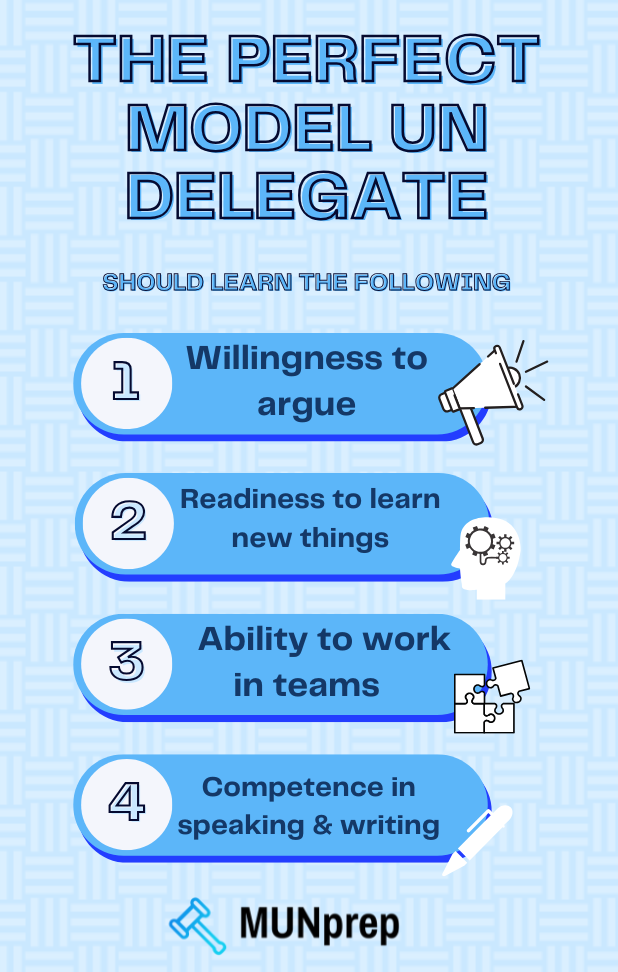
In short, anyone can get started in the world of Model UN! You just have to be willing to learn something new and step out of your comfort zone.
Model UN vocab
Model UN has a few key terms that are important to understand. We put together a list so you can get familiar with them.
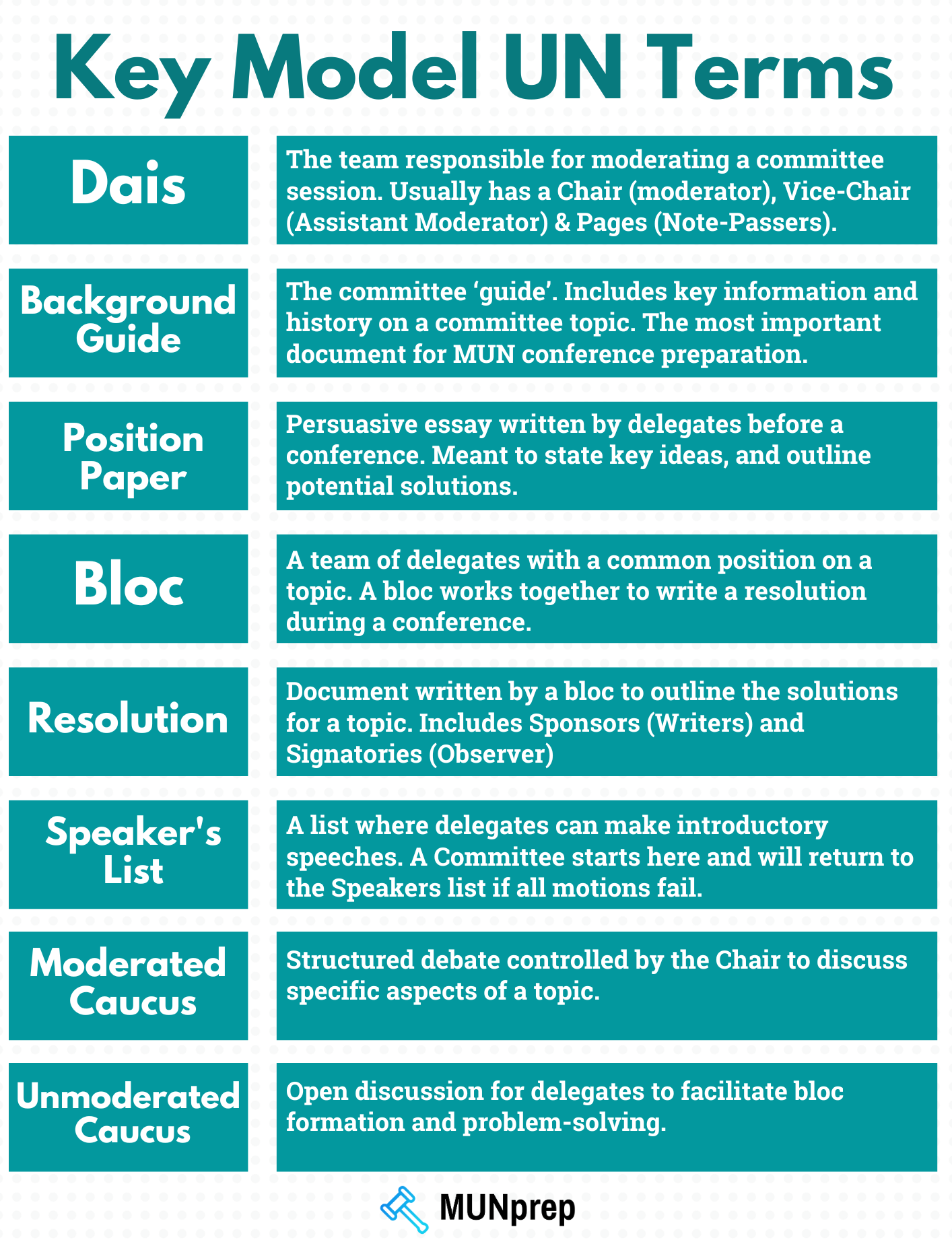
Check out our full MUN vocabulary list here!
Model UN Conferences
So how exactly does a Model UN conference work?
In general, you’ll represent a country, or person and will be tasked with solving a particular problem. You share your ideas, make arguments, and work together to write a Resolution. A conference will run for an entire weekend and will have a number of committee sessions.
Students can get involved in Model UN from middle school, and it’s possible to participate in conferences all the way through university. While conferences tend to get more technical and more is expected as delegates get older, students can still start their Model UN journey at any level and catch up quite quickly.
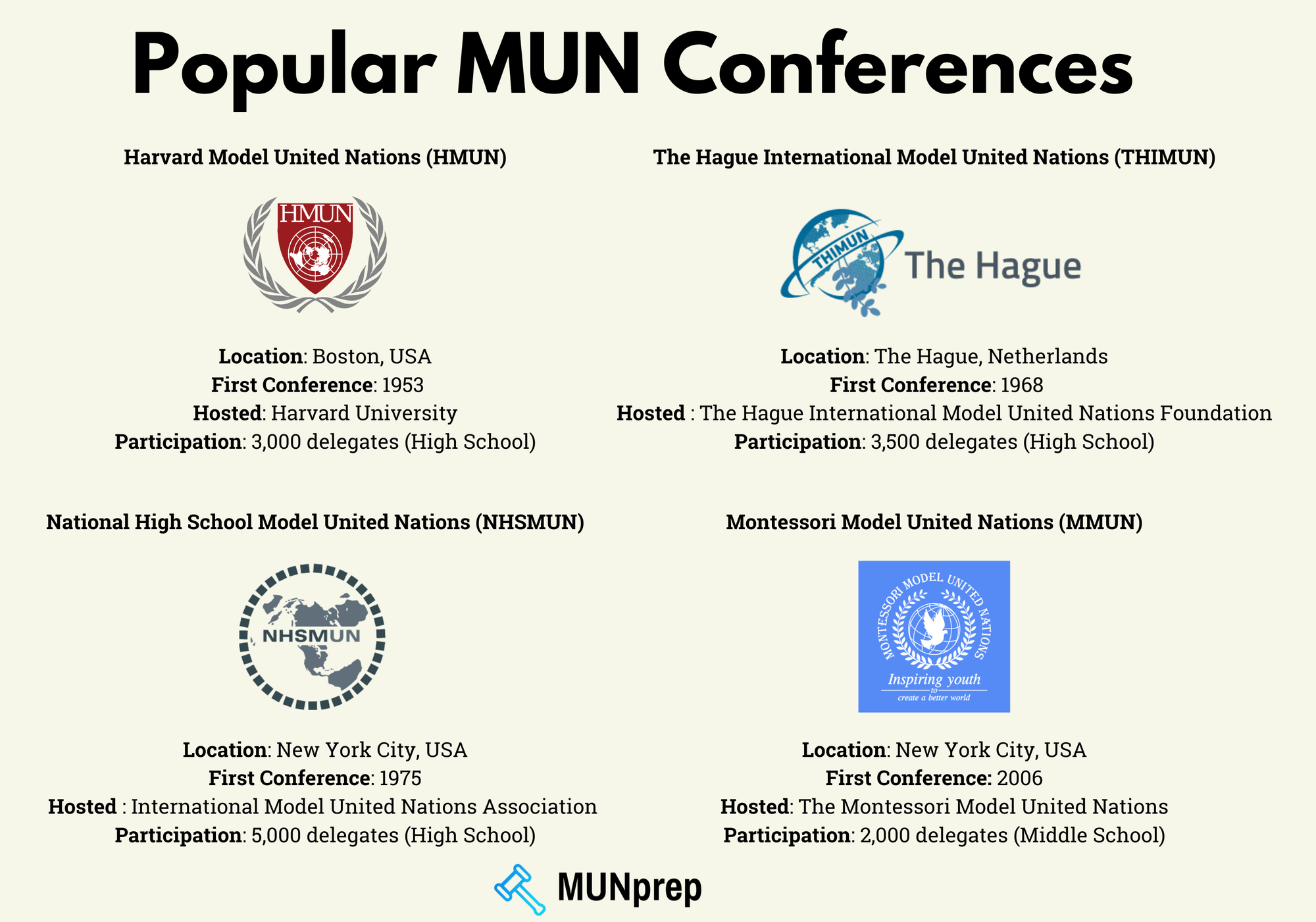
When Can You Get Started in MUN?
Nowadays, you can get involved in Model UN as early as Primary school and you can keep going all the way through University. The best way to enjoy your experience is through Model UN conferences
While conferences tend to get more technical and more is expected as you get older, students can still start at any level and catch up quickly.
- Middle School Model UN - These conferences are focused on developing confidence in public speaking while also practising the fundamentals of Model UN. Here, you will build a strong foundation for future Model UN experiences.
- High school Model UN- Focused on developing creative problem-solving approaches and building an interest in international affairs.
- University Model UN - Teams will be focused on rankings and winning awards. Delegates will generally have a strong understanding of the basics of Model UN and the problem-solving process.
Intro to the United Nations
Let’s take a quick break from Model UN and look at how the actual UN works.
What does the UN do?
To start, the UN is a global organization that works with governments to bring about an overall societal benefit. There is primary UN headquarters – located in New York along with three ‘regional’ headquarters located in Geneva, Nairobi and Vienna. From these offices, the organization works to prevent the spread of disease, fight famines, and reduce the impacts of war on marginalized communities.
The UN has developed a progressive version of conflict resolution through open dialogue that works to dissuade states from resorting to violent means.
Is the UN successful?
That's up to you to decide! On the one hand, most states have taken advantage of the platform that the UN provides and the organization has been successful in accomplishing a number of major global objectives. However, the UN is also widely criticized – some people argue that the organization could be significantly more productive if it were not caught up in bureaucracy and politics.
Learn more about the Basics of the UN here!
Significant UN achievements:
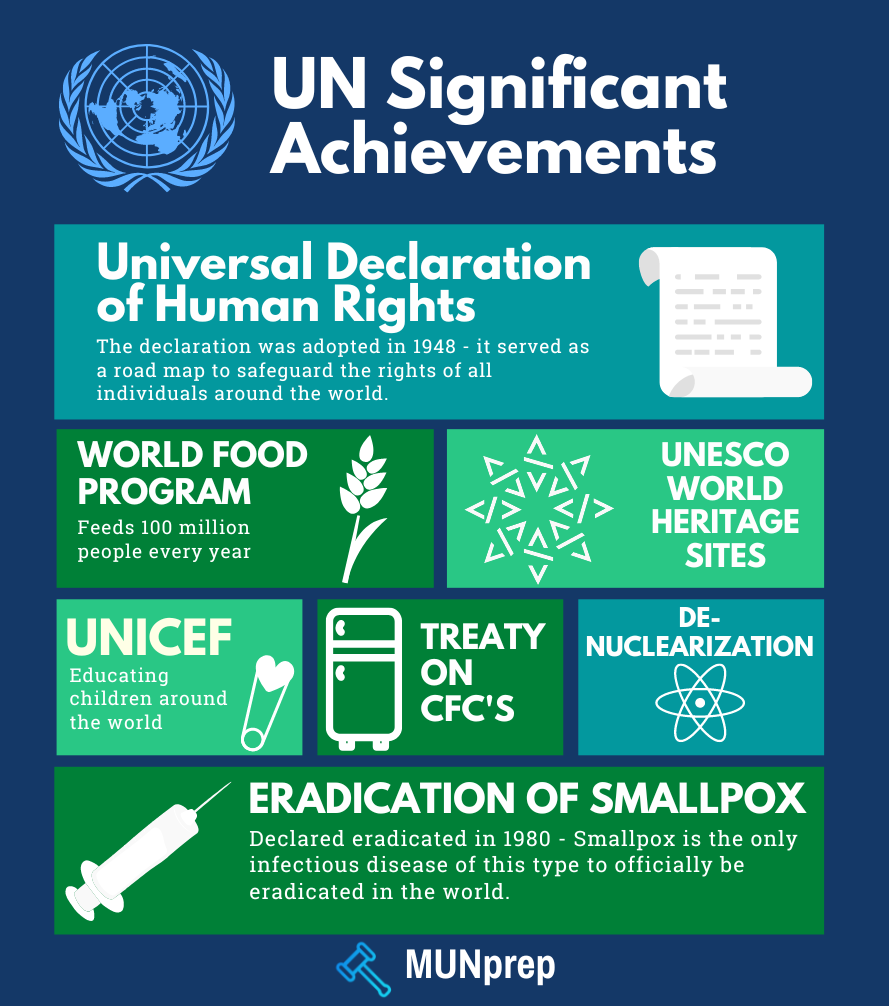
Part 2 – Model UN Conference preparation
Getting ready for a Model UN conference requires a lot of preparation, but there are ways to make this process easier.
In this section, we’ll go over the key aspects of Model UN conference preparation and give you a few tips to make sure that it’s as easy as it can be.
How does a Model UN conference work?
Your normal Model UN conference will take place over the course of a weekend – starting on Thursday night and ending Sunday morning. The goal is to have Resolutions submitted and passed by the end of the weekend. Ideally, your Bloc will be the one with the Resolution that passes.
A Model UN conference will feature a collection of committee sessions where Delegates hold discussions and progressively get closer to finding a solution to their problem. Delegates will advocate for solutions based on the research that they prepared before the conference.
Learn more about how Model UN works here!
Choosing your Model UN Committee
Picking the right committee is an important decision that will have a massive impact on your preparation process.
It will affect both the committee prep process, and your experience in-committee.
Committee Styles
Because each committee style is different, it’s likely that you’ll find something that’s right for you. At MUNprep, we break them down into the following 3 categories:
Learn more about MUN committee types here!
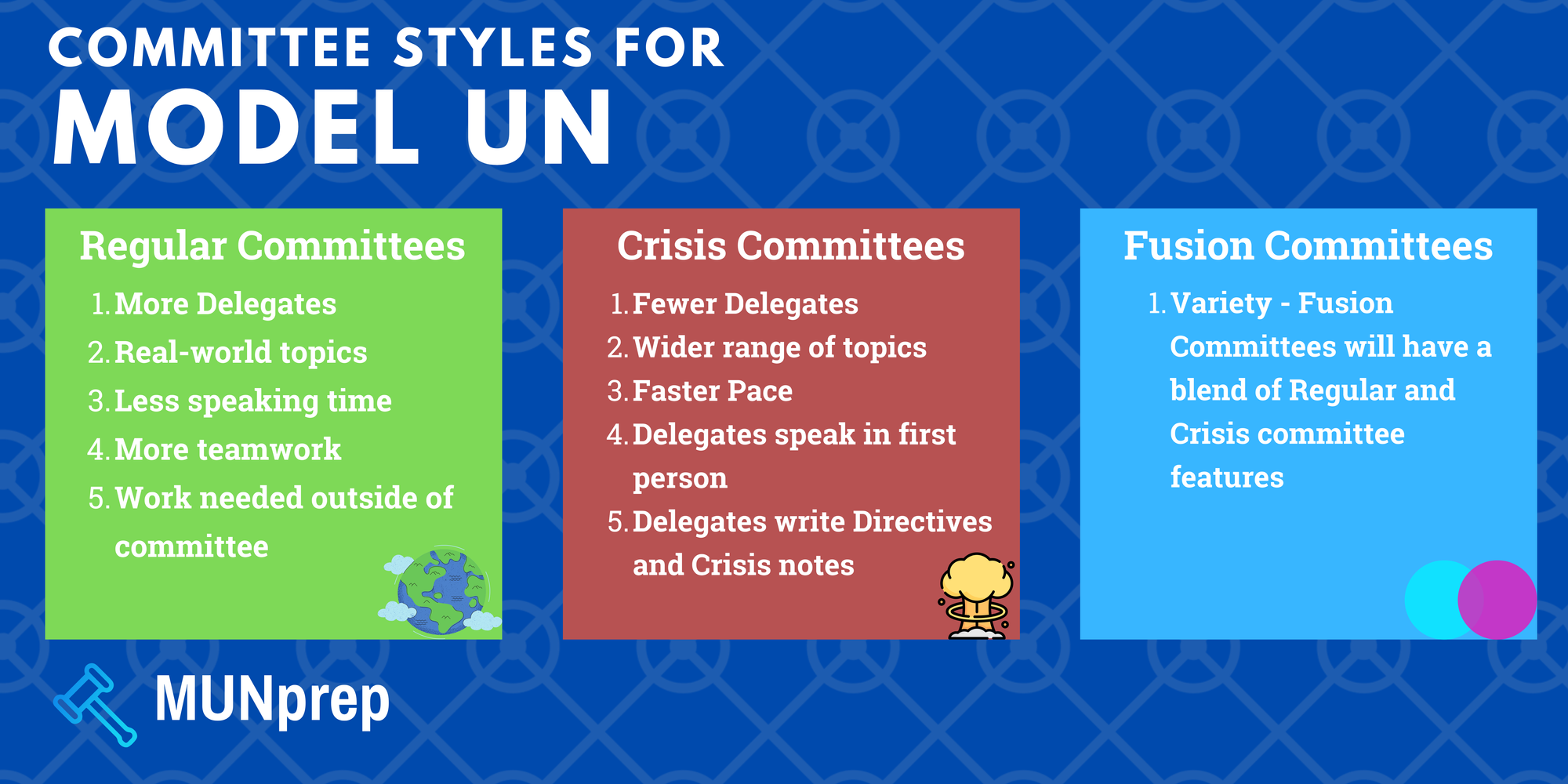
MUN Committee Topic Examples
- Regular Committees - General Assembly, UNHRC, DISEC, SOCHUM, SPECPOL, African Union, UN Women
- Crisis Committees - Board of Directors Committees (Apple Board of directors), Fantasy/Fictional Committees (Lord of the Rings, Ministry of Magic), War Committees (Trojan War, Russian Revolution)
- Fusion Committee - Security Council, AD HOC, Joint War Councils.
Check out our MUN Committee topics database here!
Double Delegate Committees
In some committees, delegates will work with a partner. Double-delegate teams can prepare for their conference together and share ideas. It can also make it easier for you in-committee, your team can split up and accomplish more. For example, one delegate can be busy making speeches in-committee while their partner is outside working with other teams.
These committees require an extra level of teamwork that can be appealing for certain students.
Double delegate committees can occur with both the Crisis and Regular committee styles. It can totally change the dynamic of a Model UN conference as updates can happen more regularly and more comprehensive resolutions can be submitted.
Check out our MUN double delegate guide here!
Your Conference Prep Journey
Timing your Conference preparation really depends on three things:
- Conference deadlines
- Preferred learning style
- Your level of experience
When preparing for your first conference you should make sure to give yourself even more prep time to make sure that you’re ready for a number of possibilities – things rarely go according to plan in Model UN! This might mean that you read your background guide and start thinking about solutions around 6 weeks before your conference.
There’s no such thing as too much preparation when it comes to Model UN. Everything you do will help you to better understand your topic and help you to exhibit that to your committee.
Model UN preparation timeline
Before you start your conference, there are 4 things that you always need to get done.
This includes:
- Reading your background guide
- Researching your topic
- Writing a position paper
- Preparing your opening speech
Here's what a standard conference prep calendar might look like:

Next, we’ll walk you through each of these steps and show you what you need to do:
1. The Background guide
Reading your Background guide should always come first. It’ll give you all the information you need to get your conference prep started off right. A Background guide gives you an overview of your topic, areas for research, and potential solutions to consider.
Your Background guide will give you your first introduction to the problem that you’re tasked with solving; with this information, you’ll want to start thinking about how this might impact your committee and what your role in it will be.
A Background guide can also be very useful since you can get a brief introduction to the members of your dais along with an idea of what they will expect from you.
To make sure that you get everything out of your Background guide, you need to do a few things first:
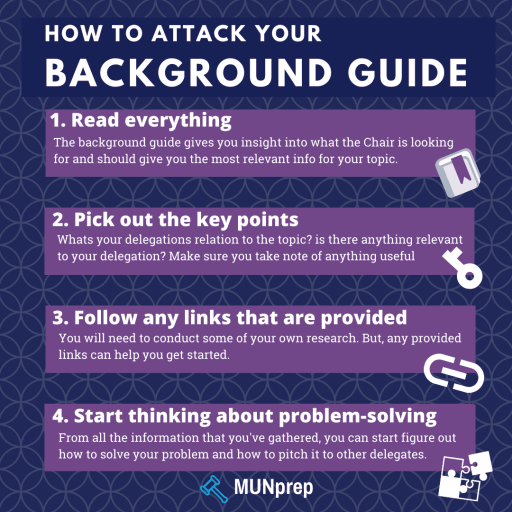
Learn more about Background Guides here!
2. Research/Building your binder
After you’ve figured out a strong starting point by going through your background guide, you’ll want to look into other sources and come up with a unique problem-solving approach.
We recommend a 2-stage research process:
- Step 1 - Identifying your Focus Question
- Step 2 - Looking deeper into your Focus Questions and creating short 'research reports'
Learn more about our MUN research process here!
Distinguishing between Opinion and Facts
Like with any research assignment, some of the research that you come across might not be factual, this means that you shouldn’t use it in your Position paper.
It’s always best to try and link anything you say in your Position paper to quality sources and authors. This can help you to be much more certain of its validity. Of course, if you find someone’s opinion to be insightful, you can try and adapt their interpretation, you can also try to find the sources that they used for their work.
If you’re ever uncertain about using any type of material, make sure that you speak with your team advisor and consult the sourcing manual for your conference.
What to include in your Research binder
In Model UN, you’re allowed to bring a binder of your research with you into the committee room. Here’s a few things that you should always have on hand:
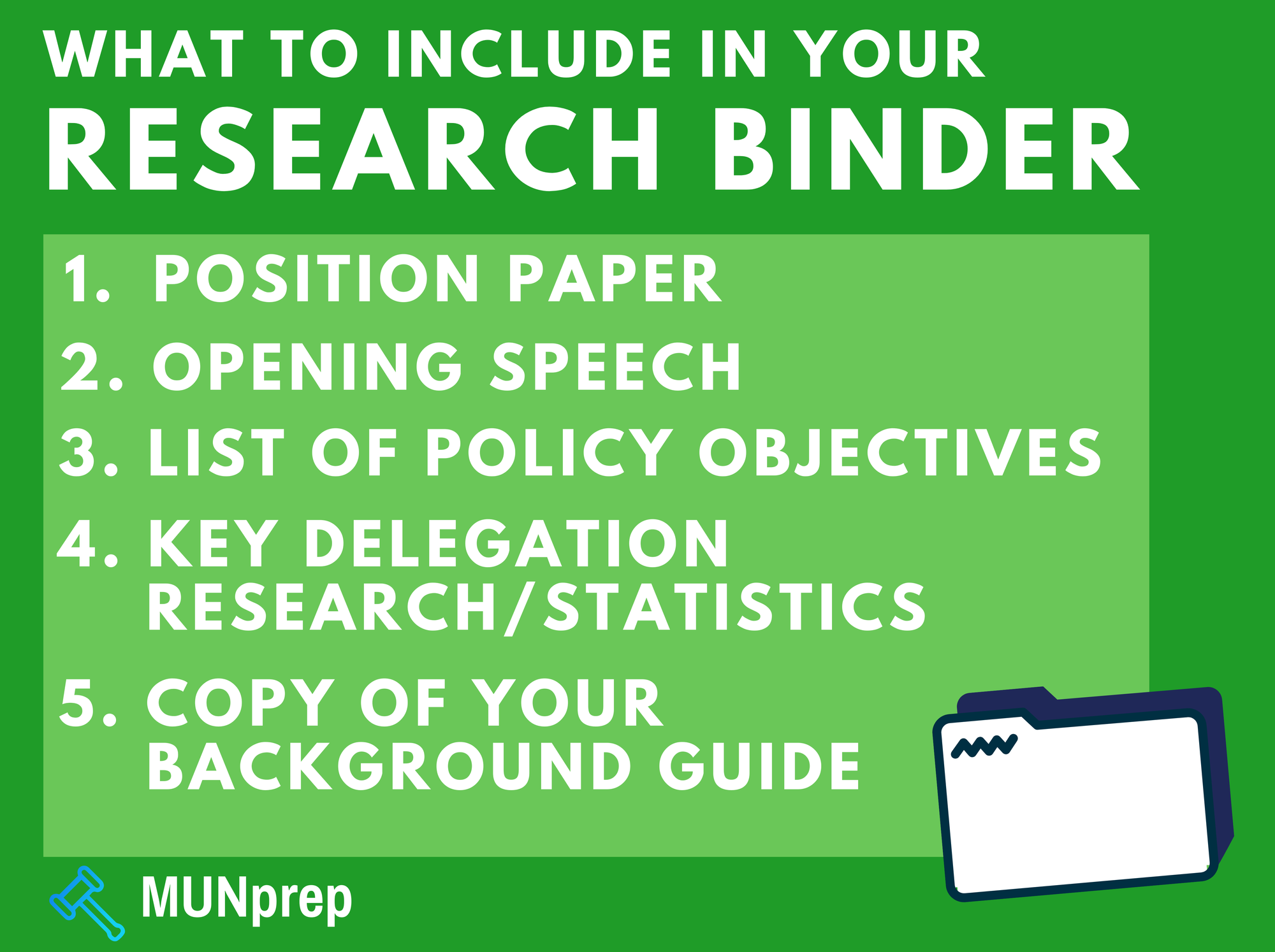
3. Creating a Policy Proposal
Now that you've conducted some in-depth research, it's time to turn what you learned into a Policy Proposal for your conference.
Your solutions are the backbone of your position paper and the foundation for your in-committee experience.
Thorough, well-marketed proposals are more likely to gain support and influence the final resolution.
Our 2 step approach includes:
- An initial feasibility analysis - This includes clarifying your objective, developing your approach and considering any counterarguments.
- Marketing your policy proposal - A lot of MUN comes down to good branding. It's important to make your policy proposals catchy so other delegates want to work with you.
Want to learn more about creating solutions in MUN? Check out our guide here!
4. The Position Paper
After you’re done with your research, it’s time to start writing your Position paper.
Your Position paper gives you a chance to organize your thoughts and is the most important part of your conference prep experience.
The Position paper is an essay that covers the committee topic from your delegations perspective. You should discuss how the topic is relevant to your delegation, how past actions have affected you, and how you want to deal with the problem.
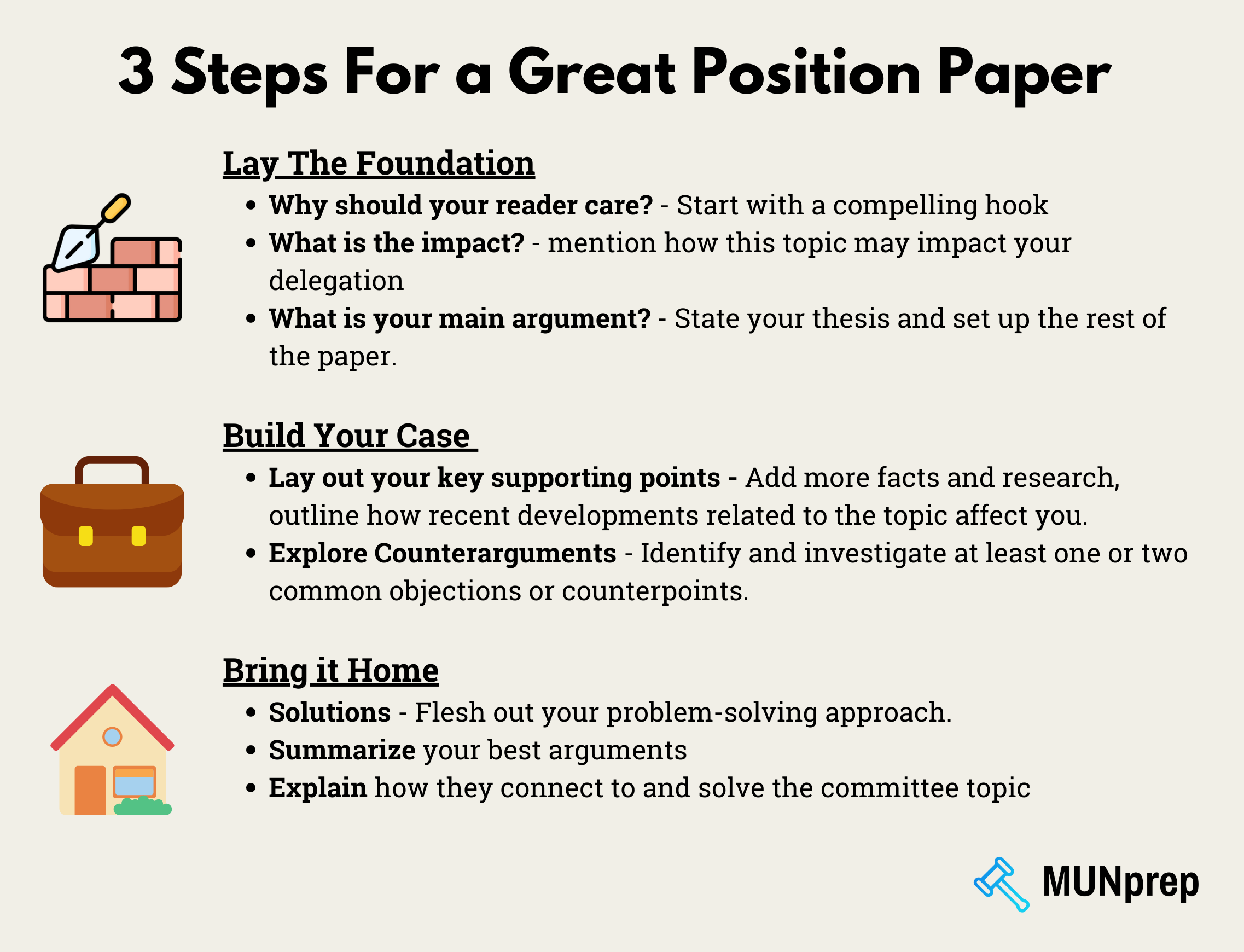
What makes a Great Position Paper?
The Best Position Papers:
1 – Show an Understanding of the matter at hand
2 – Are Carefully Researched
3 – Have the GROOVY-est solutions
4 – Concisely deal with the problem at hand.
Learn more about Position Papers in Model UN here!
5. Opening Speech
The opening speech should be your final step of the conference prep process. It’s your first chance to astound both the other delegates and your dais and is more or less a summary of the most important facts squeezed into a minute-long speech.
In this speech, you want to be clear to outline the main priorities for your delegation and show other delegates that you are open to working with them.
You know that you’ve written a strong opening speech when you start receiving a string of notes from other delegates asking to work with you.
What to include
To keep things simple – try and think about your opening speech like a summary of your Position Paper: Suggest your preferred topic, introduce your state and their position on the topic, bring in a few statistics to make your position seem stronger, and finally outline your problem-solving approach.
To make sure that your speech sticks – you can consider including:
- A Quote
- An anecdote
- A Call to action
- An Acronym
Adjusting your speech
The last thing that you should consider is that you never know how long your opening speech will need to be. Make sure you practice your opening speech and make a few different versions to account for the different possible speech times that may be required.
Sometimes, you might get unlucky and won’t get a chance to use your opening speech. This happens to everybody but you can still make use of it! You just have to be creative and find ways to use it in a moderated caucus and be proactive with the notes that you pass to other delegates.
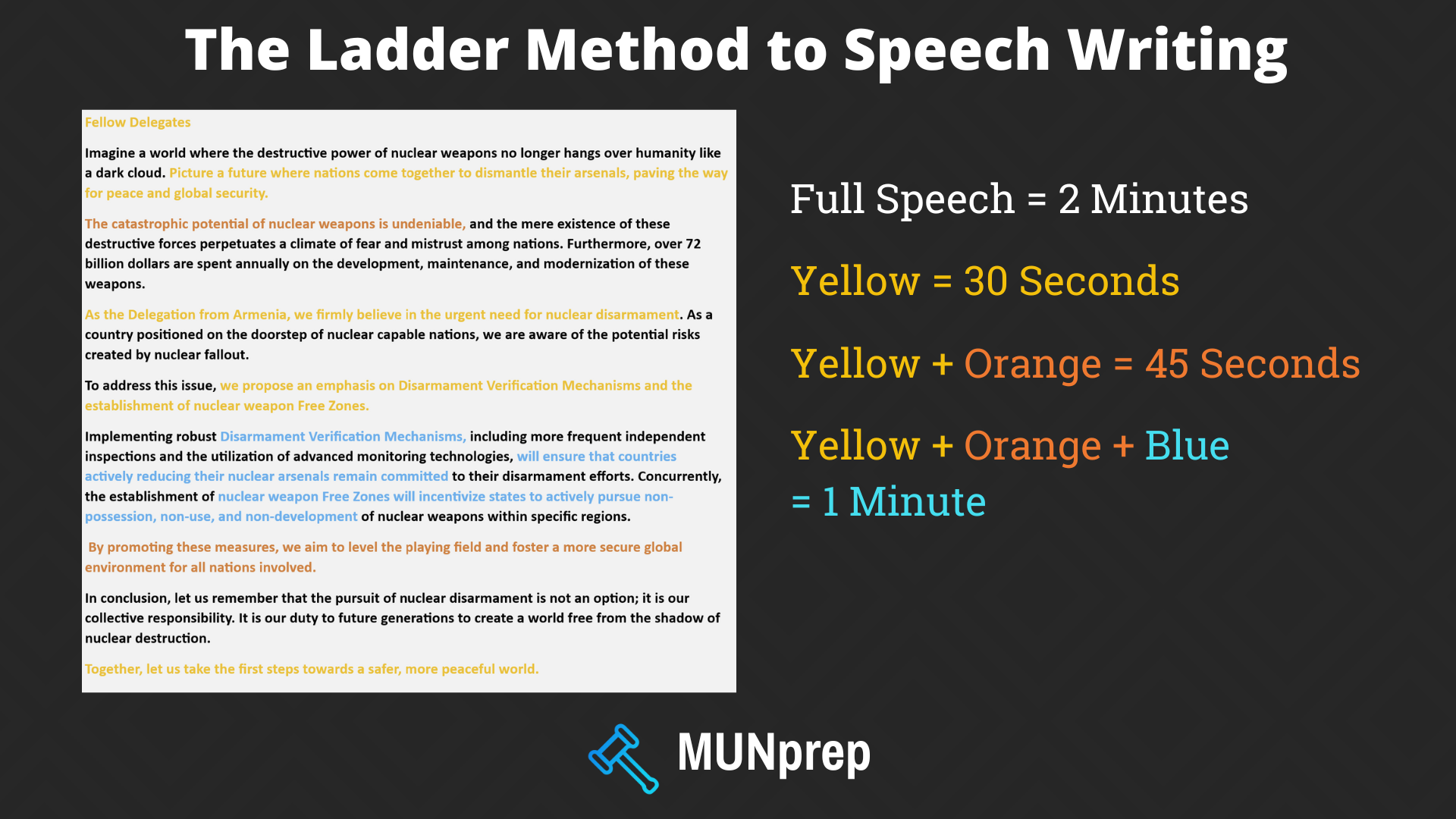
Part 3 – The Conference Weekend
Now it’s time to make the most of all your hard work – You’ve learned the Model UN essentials and gone through the Conference prep checklist.
Armed with your binder full of research notes, position papers, and opening speeches; You’re ready for action.
This section goes through a few things to keep in mind during your next Model UN conference, namely:
- What to Expect
- The Flow of Debate
- Rules of Procedure
- Model UN Discourse
- Resolutions & Amendments
- Voting
What to expect at a Model UN Conference
At a Model UN conference, you can expect to meet a number of delegates from around the world who have the same objectives as you – to represent their delegations and push for their solutions to be passed.
In general, you should expect your conference weekend to be full of informed discussion and debate. Everyone is there to learn and improve as a delegate, so don’t be afraid to reach out and talk to as many committee members as possible! The way to succeed in Model UN is through cooperation.
Staying healthy
Participating in a Model UN conference is hard work and can be quite mentally tiring – Nobody said that the life of a professional diplomat was easy!
Make sure that you do everything you can during the weekend to stay healthy. Bring food and water to the committee and try your best to get a good night’s sleep.
Having the energy to keep debating by Saturday is one of the most important things you can do.
Speeches
You should also be prepared to make a number of speeches. Speeches are important as they can help to show your involvement in-committee. It’s a useful way to quickly summarize your position on a topic to all the delegates and to your dais.
The dais will always try to give every delegate an equal amount of speaking time, but this is sometimes more difficult to manage in a larger committee. That said, always try to keep your placard up and take any opportunity to speak. If you don’t manage to speak during one Moderated Caucus, you’ll always have a chance in the next one!
If you don’t manage to get your point across when you want to, you can always bring it up with your Bloc during an Unmoderated Caucus.
Learn more about making speeches in Model UN here!
Conference Priorities
You should remember that while Model UN conferences might have awards, your priority should always be to develop a diplomatic means of communicating and emulate discussions that would take place in the real UN.
For this reason, you should always make your decisions in-committee based on how it would impact your delegation and how you think a professional representative would react in that context.
Operating based on these principles can provide a structure that will help you better make choices over the course of your conference. You will be sure that you’re going to work in a bloc where you have the greatest chance for success and can make a significant impact.
Learn about making a pre-conference plan here!
2. The Flow of debate
The Flow of debate is the general outline for how everything in your committee is going to work. It breaks down the general progression through committee sessions and how the solution-making process functions.
This starts with delegates outlining their priorities through the speaker’s list, followed by deliberations, resolution writing, and a final vote. Once problems for a certain topic have been solved, delegates can start working on the next one. This process looks something like this:
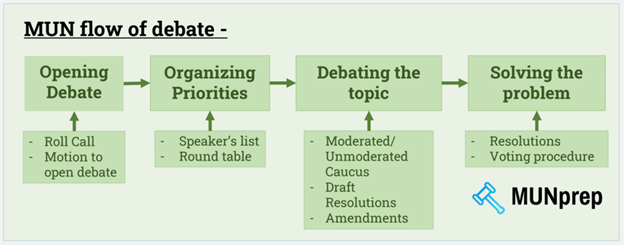
Learn more about the MUN flow of debate here!
3. Rules of Procedure in Model UN
A structure is important in Model UN and so conferences rely on something called called ‘Rules of Procedure’ (RoPs). This is a system that helps to guide both delegates and the dais on how to progress through a Model UN committee. This framework is composed of a system of Points and Motions that work based on the Flow of Debate.
Points & Motions
The system of Points and Motions is used to communicate ideas with your committee, Points are used to communicate more personal aspects of a committee. For example, if the committee room is too warm or you can’t hear someone’s speech.
Motions are used to help keep debate moving. You can motion for moderated or unmoderated caucuses, introduce resolutions and suggest amendments.
Understanding how to use Points and Motions effectively is important, if you can use them to your advantage you can encourage discussion on certain topics and get yourself extra speaking time.
Learn more about Points and Motions here!
4. Model UN Discourse
In Model UN there are a few ways to get your point across:
Moderated Caucus – A Moderated Caucus is a formal discussion on a specific aspect of the committee topic. It’s directed by the Committee Chair and can be a useful means of finding delegates to work with.
Unmoderated Caucus – The Unmoderated Caucus is a time when delegates can move around and speak informally with other delegates. It can also be an opportunity to assemble your bloc and work on Resolutions.
Speaker’s List – The speaker’s list is vital to any Model UN conference. In Regular committees, you will have two different Speaker’s lists. The Primary and Secondary Speaker’s lists.
Learn more about Caucusing and the Speakers List here!
Bonus! Note-Passing – Passing notes is a permitted practice in Model UN committees. It allows you to communicate with delegates outside of the primary flow of debate.
You can write notes to other delegates to ask questions and discuss policy objectives. This can include asking a delegate to elaborate on a speech that they made or as their opinion on a certain development.
Learn more about Note Passing in MUN here!
5. Resolutions
A Resolution is a legal document that expresses the general opinion of a committee. In Model UN, delegates will work over the course of a conference weekend in order to pass a resolution that includes their policy objectives and solves a problem in the way that they see fit.
Creating a Resolution
A Resolution takes time to make, and it goes through a few different stages before it becomes the final product.

Resolution Structure
While your Resolution might be anywhere from 5 to 50 pages long, it’s always going to have a lot of the same core components. Specifically, you need an Introduction, Preambulatory Clauses, and Operative Clauses.
Preambulatory & Operative Clauses
Preambulatory Clause – a precursor to the rest of your Resolution, think of it as an acknowledgement of the problem that you are attempting to solve.
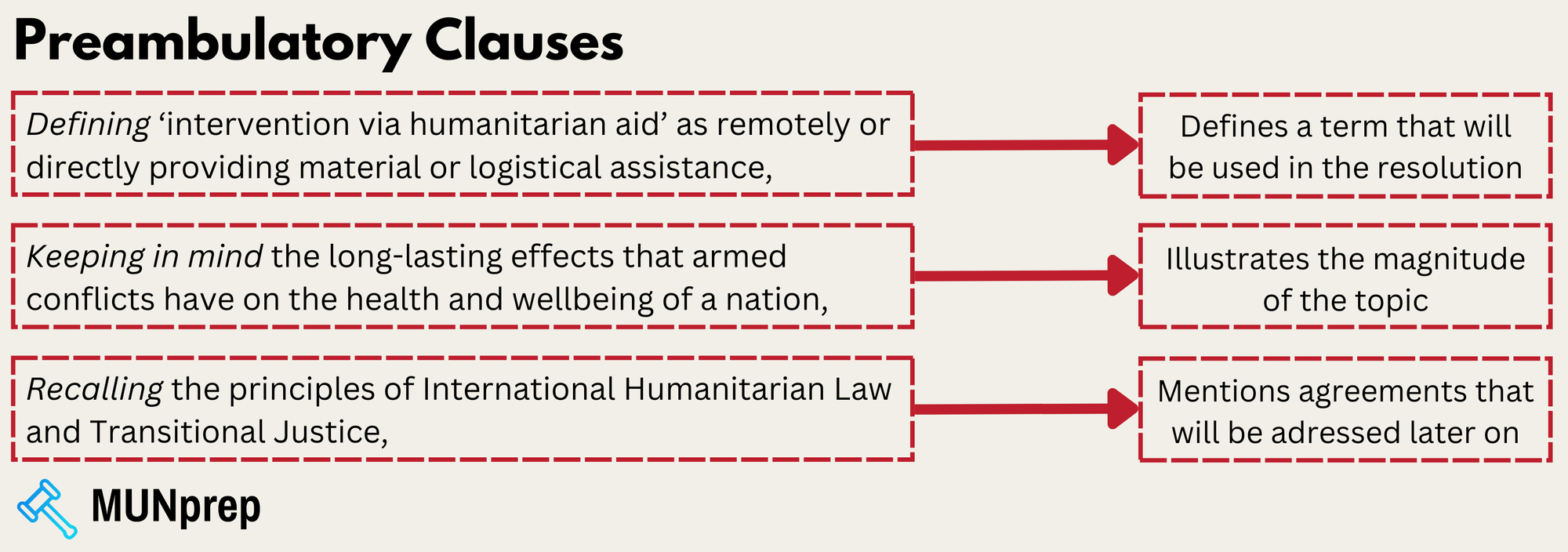
Operative Clause – You should spend most of your time writing Operative Clauses. An Operative Clause is your opportunity to showcase the solutions that you have created for your committee.
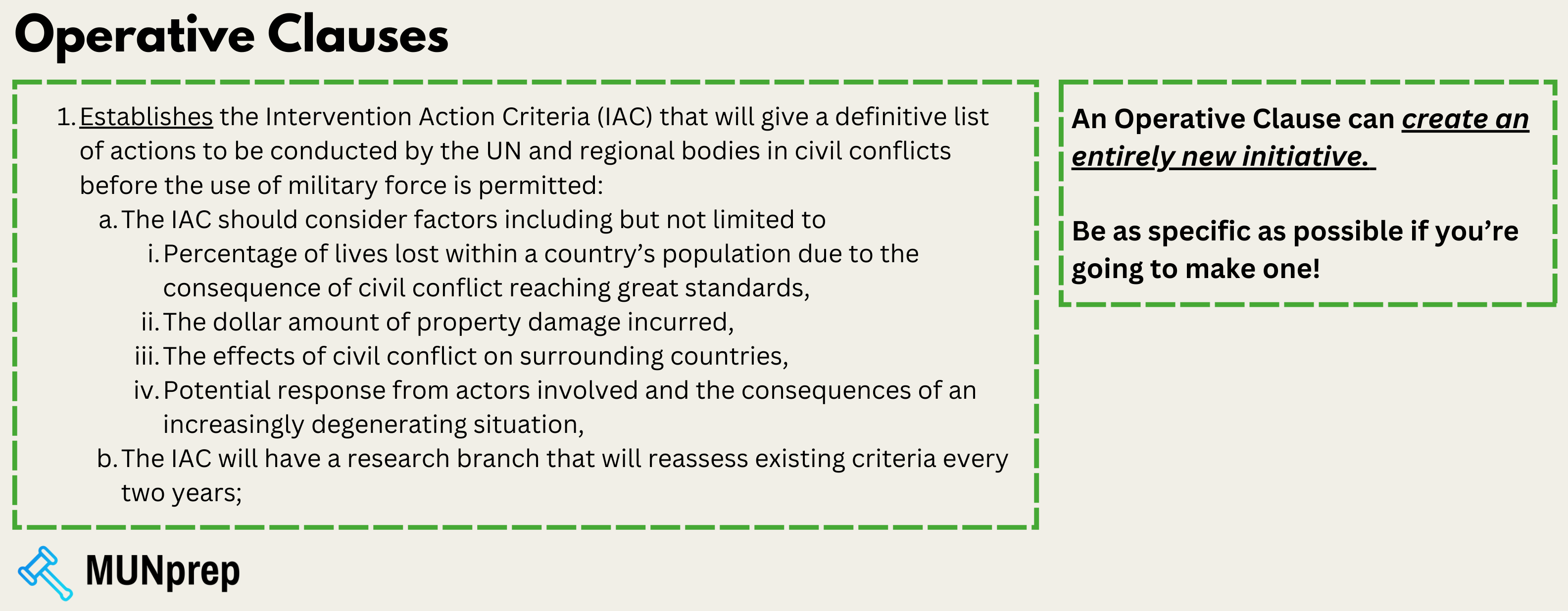
Learn more about Operative and Preambulatory Clauses here!
Amendments
The Amendment process can have a few stages as delegates try to adjust their work to get other committee members to support it.
Learn more about the MUN Amendment process here!
6. Voting in Model UN/Quorum
Voting is a way of establishing a consensus in a Model UN committee. By the end of a conference, a Delegate is going to be very familiar with the voting process.
Delegates can vote on anything from a Moderated caucus to a Resolution.
The number of votes required to pass anything works according to a Quorum – this is the minimum number of delegates required to make decisions in a committee.
A Quorum varies depending on what a delegate is voting on, but in general, for motions to pass, 1/3 to 1/2 of the delegates present in a given committee have to vote for it. For Resolutions, this is generally closer to 1/2.
For smaller committees and Crisis committees, the Quorum generally works based on a simple majority.
Part 4 – Post-conference work
A little bit of introspection is always useful at the end of a Model UN conference. You can evaluate how you did, think about ways to improve, and start planning for your next conference experience while all that Model UN knowledge is still fresh.
Once you have all that information summarized, you can start planning for your next experience and move forward knowing that you made the most of your conference.
Where to go from here
By now, you should have a strong understanding of the fundamentals of Model UN and should be ready for your next conference!
If you want to learn even more, feel free to keep things going here.
If you think this guide was helpful, feel free to tell a friend who could make use of it and don't forget to grab a copy of the Committee Handbook!
Best of luck from the MUNprep team!

